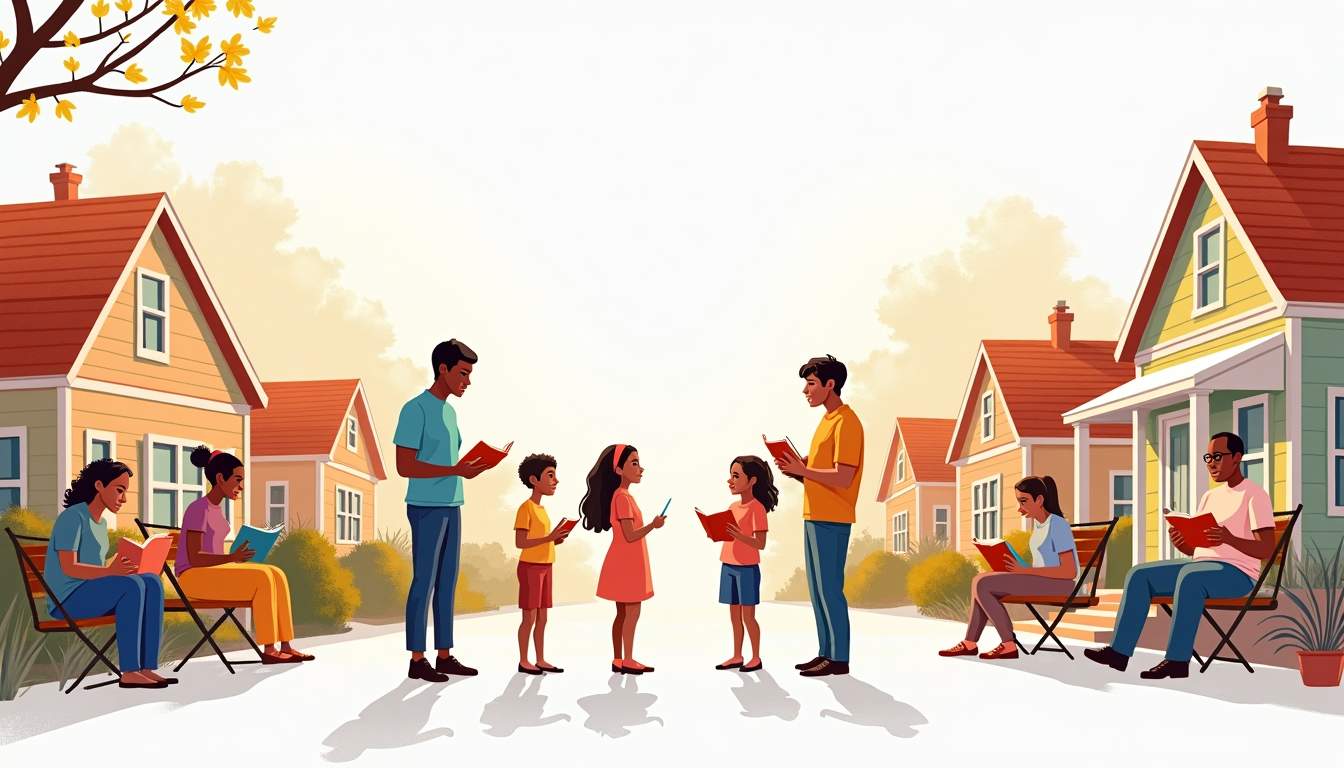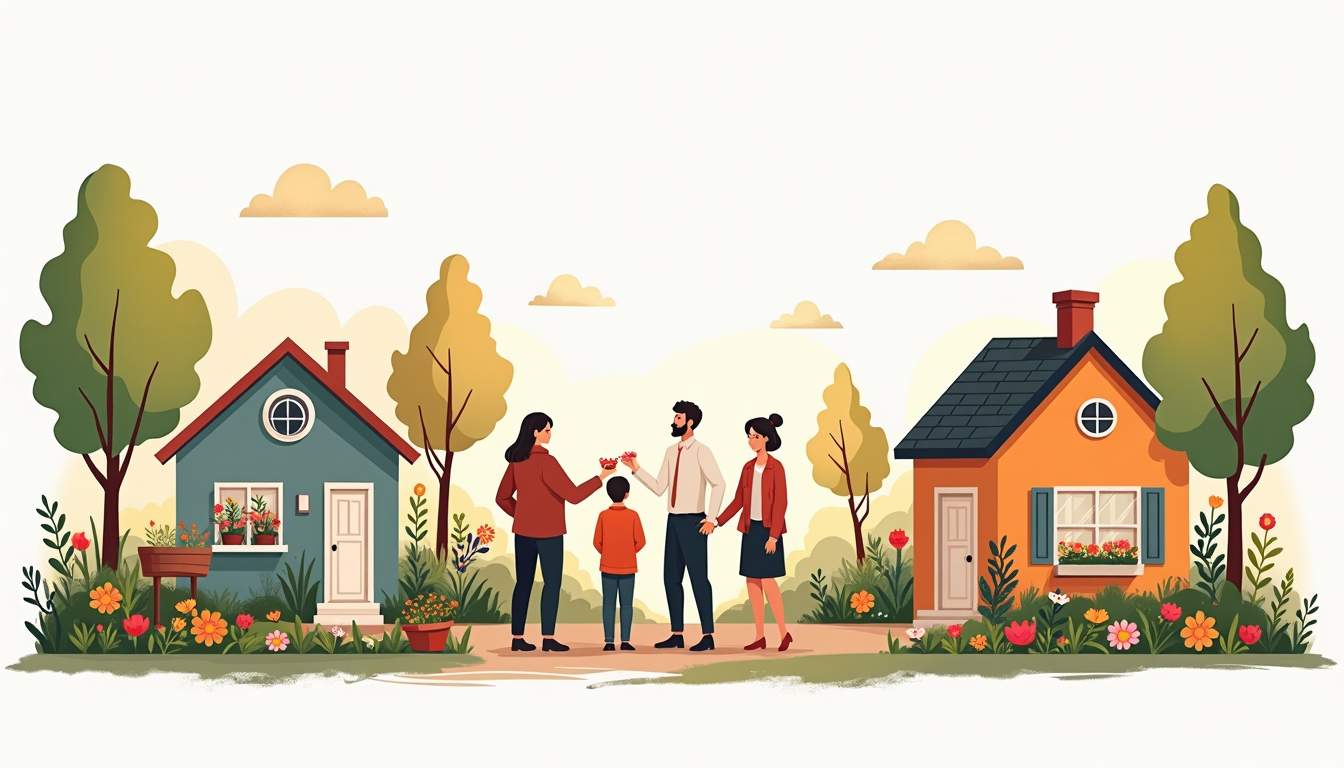
Traditional family values often refer to a set of cultural norms and practices that emphasize commitment, stability, mutual responsibility, respect for elders, and the centrality of family life. These values have roots in many different religious, cultural, and historical traditions and are expressed differently depending on local customs and beliefs.

In a modern context, supporting traditional family values does not require rejecting progress or diversity. Rather, it can mean creating social structures and community supports that help families thrive: affordable housing, good schools, accessible childcare, safe neighborhoods, and spaces where families can gather and pass on rituals and skills.
Furthermore, traditional family values today may also involve fostering open communication and emotional support among family members, recognizing the importance of mental health and individual well-being within the family unit. This progressive interpretation allows for embracing varied family compositions and modern challenges, while still upholding principles such as loyalty, care, and intergenerational support.
Technology and changing work patterns have also reshaped how families maintain these values. With the rise of remote work and digital connectivity, families have new opportunities to balance work and home life, enabling more quality time together. At the same time, communities are adapting by offering flexible resources and support networks that respect the dynamics of contemporary family life without losing sight of longstanding traditions.
When communities prioritize family stability, positive ripple effects appear across education, public safety, and economic well-being. Children raised in environments with consistent routines and strong adult role models are more likely to do well in school and participate constructively in their neighborhoods. Stable families contribute to civic life by volunteering, mentoring youth, and supporting local businesses.
Community cohesion grows when neighbors know and depend on one another. Social capital—the networks of trust and reciprocal relationships—strengthens when families can rely on dependable childcare, eldercare, or shared transportation. This sense of mutual support reduces isolation and fosters resilience in times of crisis.
Economic stability often follows social stability. Work-life balance policies that allow parents to be present for their children promote retention in the workforce and reduce stress-related health costs. Neighborhoods that support family values tend to have lower crime rates and higher property values, which benefits everyone who calls the area home.
Moreover, communities that actively engage in supporting family stability often see a decrease in the need for social services, as families are better equipped to handle challenges internally. This relief on public resources allows for reinvestment in infrastructure and community programs, creating a positive feedback loop of growth and stability. Additionally, strong family units often encourage higher educational attainment, which correlates with greater economic opportunities and healthier lifestyles over the long term.
Investing in family-focused amenities, such as parks, community centers, and parenting workshops, also nurtures a supportive environment where families flourish. These spaces not only provide safe places for recreation but foster intergenerational interactions that strengthen the fabric of the community. The shared experiences and collective engagement among families create a dynamic social environment where values such as empathy, cooperation, and responsibility are passed down, reinforcing the foundation of a resilient and prosperous community.
Several community institutions play a key role in supporting traditional family values. Religious congregations, community centers, schools, and civic organizations provide places for families to connect, learn, and serve together. Each of these institutions contributes uniquely to the social fabric.
Religious congregations often offer rituals and teachings that reinforce commitments to marriage, parenting, and care for elders. More broadly, they provide practical support—meal trains during crises, counseling services, and youth programs—that live out those teachings in concrete ways.
Public schools can be anchors of community life by offering family-focused events, parenting workshops, and after-school activities that keep children engaged and safe. Partnerships between schools and local organizations expand opportunities for enrichment, tutoring, and mentorship that complement family efforts at home.
Community centers host activities that bring multiple generations together—recreation leagues, arts programs, and volunteer opportunities. Civic groups focused on neighborhood improvement build a shared stake in local quality of life, encouraging families to participate in civic planning and decision-making.
Parenting within a community that values family involves more than the household unit. Mentorship and intergenerational relationships are essential components. Grandparents, older neighbors, teachers, coaches, and religious leaders each contribute perspectives and continuity that form a child’s moral and social education.

Programs that encourage mentorship connect young people with adults who can model steady work ethic, faithfulness in relationships, and civic responsibility. These relationships create safety nets when nuclear family structures face stress and provide youth with multiple loving adults to turn to for guidance.
Practical supports like parenting classes, accessible pediatric care, and flexible work schedules make it easier for parents to practice the values they wish to transmit. Communities that invest in parental leave policies, quality early childhood education, and weekend family programming help sustain the everyday work of raising children.
Respecting elders and ensuring their involvement in community life reinforces continuity. Elders provide history, stories, and practical wisdom—how to fix a leaky roof, prepare cultural recipes, or navigate life’s setbacks. When communities facilitate elder involvement—through intergenerational housing, volunteer roles, or advisory positions—families gain a living connection to their past.
Supporting traditional family values can raise legitimate concerns about inclusivity and change. Communities must balance honoring longstanding practices while respecting the dignity and rights of all residents, including those from diverse family forms and backgrounds.
Rigid or exclusionary interpretations of tradition can alienate single parents, blended families, adoptive families, and LGBTQ+ households. A constructive approach affirms the principles of commitment, responsibility, and mutual care without prescribing a single acceptable family structure.
Change is inevitable in any living community. Honest conversations that foreground common goals—healthy children, stable homes, and mutual respect—help bridge differences. Listening sessions, community forums, and inclusive programming allow families to express needs and find common ground.
Economic inequality undermines the ability of families to live out their values. Affordable housing, job training, childcare subsidies, and transportation access are not ideological add-ons; they are practical necessities. A community serious about traditional family values invests in policies that remove barriers for families to thrive.
There are many tangible steps neighborhoods and municipalities can take to foster a community that supports traditional family values. Small actions and long-term policies combined create an environment where families feel supported and connected.

Parks, playgrounds, family-oriented libraries, and safe walking paths encourage families to spend time together in public spaces. Designing neighborhoods with mixed-use areas—where schools, shops, and recreational facilities are within easy reach—makes daily life more manageable and community life more vibrant.
Volunteer programs that pair families with community projects create opportunities to serve together, model civic responsibility, and build friendships across generational lines. Projects like community gardens, neighborhood cleanups, and service days help families contribute tangibly to the common good.
Accessible premarital counseling, marriage enrichment classes, and relationship workshops offer couples tools for communication and conflict resolution. While counseling should be voluntary and confidential, promoting healthy relationships benefits children and strengthens household stability.
Affordable, high-quality after-school programs reduce risk exposure for children and provide enrichment that families might not be able to offer alone. Sports, arts, STEM activities, and life-skills classes engage young people and build character, while giving parents reliable childcare options.
Examples of supportive community action often look ordinary: a church organizing a back-to-school drive, a neighborhood association setting up carpools, a local bakery donating pastries for a family reunion hosted at the community center. These small acts create a web of care that makes family life easier and more joyful.
Consistent, everyday support tends to matter more than grand gestures. Reliable babysitting circles, parent support groups, and elders teaching gardening skills are the kind of steady practices that sustain values across time.
Communities can measure progress toward supporting family values with a mix of quantitative and qualitative indicators. Metrics might include high school graduation rates, rates of stable housing, participation in volunteer programs, and the number of family-focused events. Surveys and personal stories reveal how residents actually experience these supports.
Regular evaluation allows communities to adapt. What worked five years ago may need refinement today. Listening to underrepresented families, adjusting services for changing demographics, and updating policies in response to new economic realities keep community efforts effective and relevant.
Building a community that supports traditional family values is a shared endeavor that requires patience, commitment, and humility. It asks neighborhood leaders, institutions, and families themselves to invest in structures and relationships that promote stability, responsibility, and mutual care.
When communities commit to practical supports—affordable housing, quality education, accessible childcare, and multigenerational opportunities—families gain the conditions they need to flourish. The result is not a retreat from modern life, but a thoughtful integration of time-honored values with the realities of contemporary society, producing neighborhoods where children grow up secure and adults find meaning in shared responsibility.
At Tennessee National, we understand that a supportive community is the foundation for families to thrive. Nestled in the serene landscapes of Tennessee, our premier gated community combines luxury living with spaces designed to foster connection, tradition, and well-being. From our Greg Norman Signature Golf Course to waterfront dining and family-oriented amenities, Tennessee National invites you to experience resort-style living that honors the values you hold dear. Schedule a Private Tour today and take the first step toward making lifelong memories in a place where family comes first.